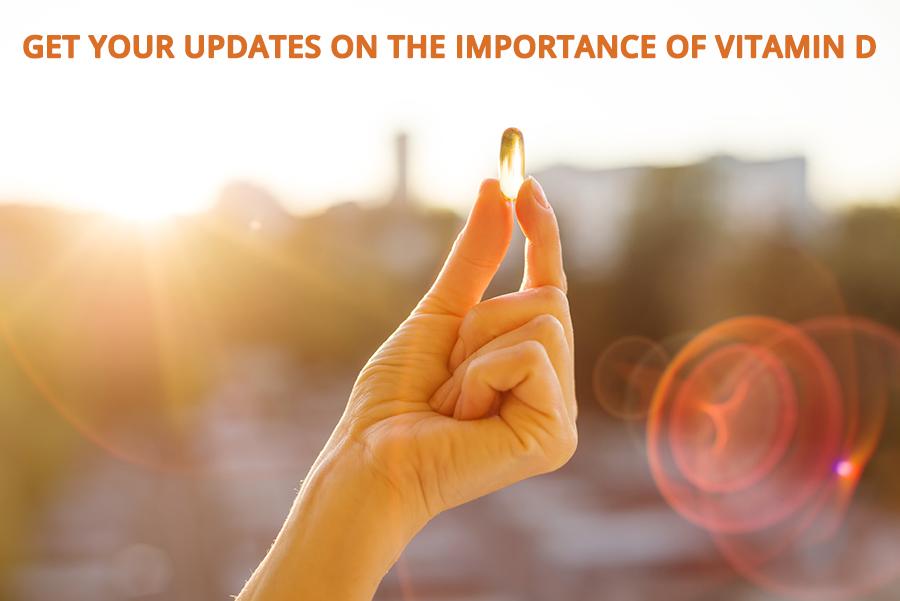This year has certainly been a banner year for vitamin D. Long known as an important player in immune health, the sunshine vitamin has gained more notoriety than ever and, in the times of COVID-19, for good cause.Scientists have been diligently studying COVID-19 and all of the potential drugs and nutrients that might help us fight off this horrible infection. The star of these studies has been vitamin D. We have seen a multitude of studies this year showing that vitamin D not only prevents COVID-19 infection, but it also greatly improves outcomes for those that do get COVID. It has been shown to prevent hospitalizations and shorten hospital stays, and reduces the risk of death by COVID-19.It goes without saying that if a drug had anywhere near this type of benefit, we would all be taking it.
 Deficiency of vitamin D is, unfortunately, rampant. Because of its essential role in so many different body systems, vitamin D deficiency has been linked to increased risk of heart attack, cancers, autoimmunity, asthma, and infections (like COVID-19). It is estimated that over 70% of Americans are deficient in this very important vitamin.While you can get some vitamin D from exposure to UV rays in sunlight, it is extremely difficult to get enough exposure to replete a deficiency. It is widely thought that those of us living above the 37th parallel cannot make much vitamin D from the sun at all. Vitamin D absorption is also dependent upon the season, cloud coverage, time of day, air pollution, skin color (the darker your skin, the less you absorb from the sun), age (the younger you are, the more you absorb), and sunscreen use.Certain foods do have vitamin D in them and I strongly advise that you eat these healthy foTods often. The best sources are fatty fish, seafood, mushrooms, and egg yolks.
Deficiency of vitamin D is, unfortunately, rampant. Because of its essential role in so many different body systems, vitamin D deficiency has been linked to increased risk of heart attack, cancers, autoimmunity, asthma, and infections (like COVID-19). It is estimated that over 70% of Americans are deficient in this very important vitamin.While you can get some vitamin D from exposure to UV rays in sunlight, it is extremely difficult to get enough exposure to replete a deficiency. It is widely thought that those of us living above the 37th parallel cannot make much vitamin D from the sun at all. Vitamin D absorption is also dependent upon the season, cloud coverage, time of day, air pollution, skin color (the darker your skin, the less you absorb from the sun), age (the younger you are, the more you absorb), and sunscreen use.Certain foods do have vitamin D in them and I strongly advise that you eat these healthy foTods often. The best sources are fatty fish, seafood, mushrooms, and egg yolks. We really do need to depend on supplements to optimize our vitamin D levels. I highly recommend that you, first, have your vitamin D levels checked, at least twice a year. The Vitamin D Council recommends levels between 40 and 80 ng/mL. I can help you, based on your levels, weight, and skin color, determine an appropriate dose. Then, retest again 3 months later to make sure you are within the recommended range, without going over or under. Vitamin D, when excessive, can lead to just as many health problems as low vitamin D levels, so it is worth testing to make sure you are in the optimal range. Please contact me to learn more or to schedule your consultation.As we enter the warm and sunny months, do not be afraid to go outside and enjoy the sunshine. There are many benefits of sun exposure, including raising your vitamin D levels.
We really do need to depend on supplements to optimize our vitamin D levels. I highly recommend that you, first, have your vitamin D levels checked, at least twice a year. The Vitamin D Council recommends levels between 40 and 80 ng/mL. I can help you, based on your levels, weight, and skin color, determine an appropriate dose. Then, retest again 3 months later to make sure you are within the recommended range, without going over or under. Vitamin D, when excessive, can lead to just as many health problems as low vitamin D levels, so it is worth testing to make sure you are in the optimal range. Please contact me to learn more or to schedule your consultation.As we enter the warm and sunny months, do not be afraid to go outside and enjoy the sunshine. There are many benefits of sun exposure, including raising your vitamin D levels.
So, go ahead and take your vitamin D!Vitamin D is a nutrient that you can eat or take as a supplement. It is also a hormone that is made by the body when the skin is exposed to UV light. Vitamin D is then activated by the liver and kidneys into its active form.Once active, vitamin D plays a role in bone mineralization (it helps the bones absorb more calcium and other minerals), cellular growth and regeneration, neuromuscular function, blood sugar and insulin regulation, and immune function. Every cell in the body has a receptor for vitamin D which, when activated by the vitamin itself, has the ability to control the expression of over 200 genes.
 Deficiency of vitamin D is, unfortunately, rampant. Because of its essential role in so many different body systems, vitamin D deficiency has been linked to increased risk of heart attack, cancers, autoimmunity, asthma, and infections (like COVID-19). It is estimated that over 70% of Americans are deficient in this very important vitamin.While you can get some vitamin D from exposure to UV rays in sunlight, it is extremely difficult to get enough exposure to replete a deficiency. It is widely thought that those of us living above the 37th parallel cannot make much vitamin D from the sun at all. Vitamin D absorption is also dependent upon the season, cloud coverage, time of day, air pollution, skin color (the darker your skin, the less you absorb from the sun), age (the younger you are, the more you absorb), and sunscreen use.Certain foods do have vitamin D in them and I strongly advise that you eat these healthy foTods often. The best sources are fatty fish, seafood, mushrooms, and egg yolks.
Deficiency of vitamin D is, unfortunately, rampant. Because of its essential role in so many different body systems, vitamin D deficiency has been linked to increased risk of heart attack, cancers, autoimmunity, asthma, and infections (like COVID-19). It is estimated that over 70% of Americans are deficient in this very important vitamin.While you can get some vitamin D from exposure to UV rays in sunlight, it is extremely difficult to get enough exposure to replete a deficiency. It is widely thought that those of us living above the 37th parallel cannot make much vitamin D from the sun at all. Vitamin D absorption is also dependent upon the season, cloud coverage, time of day, air pollution, skin color (the darker your skin, the less you absorb from the sun), age (the younger you are, the more you absorb), and sunscreen use.Certain foods do have vitamin D in them and I strongly advise that you eat these healthy foTods often. The best sources are fatty fish, seafood, mushrooms, and egg yolks. We really do need to depend on supplements to optimize our vitamin D levels. I highly recommend that you, first, have your vitamin D levels checked, at least twice a year. The Vitamin D Council recommends levels between 40 and 80 ng/mL. I can help you, based on your levels, weight, and skin color, determine an appropriate dose. Then, retest again 3 months later to make sure you are within the recommended range, without going over or under. Vitamin D, when excessive, can lead to just as many health problems as low vitamin D levels, so it is worth testing to make sure you are in the optimal range. Please contact me to learn more or to schedule your consultation.As we enter the warm and sunny months, do not be afraid to go outside and enjoy the sunshine. There are many benefits of sun exposure, including raising your vitamin D levels.
We really do need to depend on supplements to optimize our vitamin D levels. I highly recommend that you, first, have your vitamin D levels checked, at least twice a year. The Vitamin D Council recommends levels between 40 and 80 ng/mL. I can help you, based on your levels, weight, and skin color, determine an appropriate dose. Then, retest again 3 months later to make sure you are within the recommended range, without going over or under. Vitamin D, when excessive, can lead to just as many health problems as low vitamin D levels, so it is worth testing to make sure you are in the optimal range. Please contact me to learn more or to schedule your consultation.As we enter the warm and sunny months, do not be afraid to go outside and enjoy the sunshine. There are many benefits of sun exposure, including raising your vitamin D levels.



